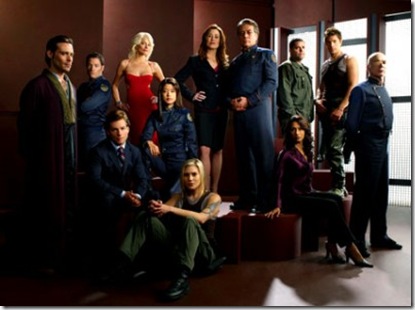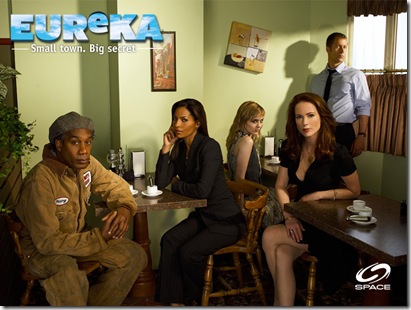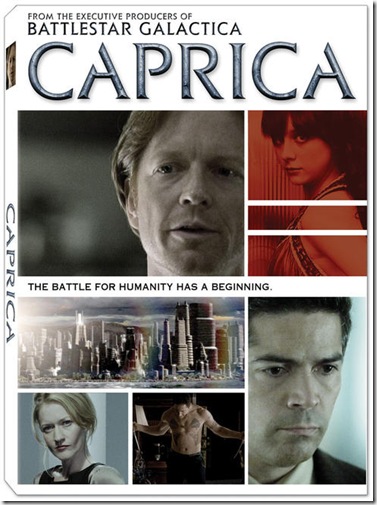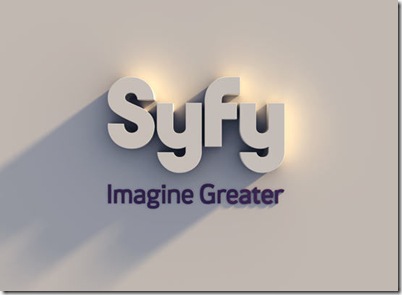There have been a lot of responses to the rebranding of the SCI FI Channel to Syfy, which takes effect on July 7, 2009. Most of those responses [as is usual on the good ole Interweb] have been negative – and there’s been a question of whether SCI FI appropriated the name from a popular website that had existed for ten years before a sudden name change. SCI FI honcho, Dave Howe said of that situation, “Once we settled on Syfy it became apparent to us that, you know, the Syfy Portal existed.” Of course, he said a lot more than as he attempted to give us a better understanding of the process of rebranding and its ramifications for the channel’s future.
(Fearless leader note – Do I deliver or what? I told you last week I’d try and get Dave to spill his guts about this stupid name change, unfortunately I was in the middle of moving to Florida so couldn’t sit in. But our fellow Sci-Fi Digital Press folks put his Dave’s feet to the fire. Great job Ken! Participants in this teleconference call included: Ken Gold [Media Boulevard], Meredith Woerner [i09.com], and Kelly West [cinemablend.com].
So the first question I have I guess what we’re getting after, what I’m seeing out in the fan sites and kind of on the Internet is the origin of the name Syfy, I mean, I think you probably know that, you know, there was another really popular site out there using that name. And there seems to be not a lot of recognition out there or at least a lot of people are saying that NBC and the SCI FI Channel is not acknowledging that. Can you comment on that or…
Dave Howe: Not acknowledging what that…
Syfy Portal…
Yeah, which is…
DH: I don’t think that’s the case that we’re not acknowledging it. I think the, you know, how this
– how our name came about, I mean, we’ve been doing – we’ve been actively working on this
brand evolution for the last two years. And we’ve explored a lot of name options. And I think at
the point at which there are any short list of names the first thing we do obviously is look at the
URLs and look at whether any of the names are trademark protectable.
And I think once we looked at alternative names and we also looked at whether there was a way of taking ownership of our existing name through, you know, an addition of extra letters or changing the order of the letters I think once we settled on Syfy it became apparent to us that, you know, the Syfy Portal existed.
And, you know, we haven’t, you know, we haven’t not commented on that directly. And that’s a point of fact that Syfy Portal is now (off our analog).
If you guys are changing the brand name or changing the name it seems like the last few years or the last maybe two or three years SCI FI has really gone beyond what – at least what I would call hardcore sci-fi, I mean, you’ve kind of expanded into the reality shows and, yeah, some of those have a sci-fi tinge but maybe like a State of Panic and, you know, some of the others which are, you know, very good shows, I love the shows, Chase, for example.
And the wrestling stuff, I mean, it kind of embraces more than just hardcore sci-fi. So if you’re looking at a brand why just go with kind of a phonetic change of SCI FI rather than I guess coming up with something that embraces maybe what the network has really become over the last few years?
DH: I think the honest answer to that actually is that we didn’t come up with a name that we liked any better than what we’ve gone with which was Syfy. Naming is an incredibly… incredibly tough exercise. And, you know, I’ve been at SCI FI for eight years, I’ve been in the TV business, you know, a marketing head for about 20 years. And trust me the hardest and the toughest thing to ever get to is a name that everybody likes; it’s incredibly subjective. It’s never going to solve all of life’s problems for you. There will always be things that it does communicate, things that it doesn’t communicate.
But at the end of the day, you know, as you rightly said, people watch content, people watch shows. And, you know, they’re not going to be drawn to something or alienated from something necessarily just because of the name. So, you know, we didn’t come up with a name – a short listed name that we liked.
And just to your point about Syfy Portal, the other thing actually which I forgot – the other point which I forgot to make is we were able to secure syfy.com before we even entered into a conversation with Syfy Portal. So although, you know, that name was taken in relation to Syfy Portal, syfy.com was available and we secured that and very early on this process.
I’m directly speaking to the letter that (Mitch Rubinson) wrote today about Isaac Asimov approving the name SCI FI Channel before it launched. And do you think were they around today they would approve of the change from SCI FI Channel to the Syfy Channel?
DH: I honestly suspect not. I mean I wasn’t around – in fact I wasn’t even aware of the genesis of the network and the name etcetera. But I think when I read that piece and actually (Sally) who you know, head of PR, passed it on to me, I think the thing that struck me most about it is, I suspect if we took them through the rationale as to why we were changing they would probably get it because, you know, if you read that piece it kind of says that when it launched it was launched as the science fiction channel exclusively. And that it was primarily about space about technology and the future and essentially Star Trek.
And I think that is something that, you know, we in no shape or form want to get away from but I think what we want to do is move to a position where we can earn, you know the broad sci-fi fantasy landscape and include in there fantasy and paranormal and supernatural and super hero and, you know, some of those speculative action and adventure. I think that’s absolutely the object of this exercise so it’s about how do we embrace the broader sci-fi fantasy landscape as opposed to how do we escape from our past? That isn’t the object of this exercise.
I’m curious if you have any other comments about the letter that was released today besides what, you know, the past members who are no longer with us would think. Are there any more comments you have after reading that?
DH: No, I mean, you know, I just kind of made the point, I mean, you know, if you look at – if you look at the range and diversity of our programming on air, you know, we still have Star Trek on air, we have still have Battlestar Galactica and Stargate Atlantis, soon to become Stargate Universe.
But alongside that there’s Eureka, you know, we’re launching Warehouse 13, somebody earlier mentioned Chase, Estate of Panic, you know, Who Wants to be a Superhero. You know, we have a very broad range of content and the challenge that we have is if you talk to consumers who don’t watch our channel the expectation and the anticipation around when they do surf up the dials to SCI FI is that all they’ll find there is Star Trek.
And clearly that isn’t something from a branding perspective and from a future perspective that enables us to do what we want to do which is becoming inclusive and bring more people in who we know will enjoy a broader range of shows and hopefully we can kind of cross sell and cross promote and cross convert to other shows once they come to us.
But the challenge for us is if they don’t think that space opera is for them then they’re not going to come.
I just wondered, it seems like by the fact you’re doing this call today that I don’t know if this is in response to – I have seen some I guess negative comments about the name change, some kind of nasty, some actually pretty positive about it.
Are you tracking or is somebody at the network tracking I guess kind of your core fan base response? And just looking at how people were taking it?
DH: Yes we are tracking it. And, you know, we’re reading all of the message boards and Twitter and we’ve got people basically monitoring it all. And, you know, I get like a summary of what people are saying. And I’m not, you know, I’m not surprised at all by the comments that we’re hearing. I mean I think the, you know, the points I would make is that none of us particularly like change; none of us like the idea of a new name.
I mean a lot of new names out there were not particularly well received when they were announced. I mean, Nintendo Wii was not exactly… great and Tivo and all the rest of those names. I think the reason that we wanted to do this conference call today is because the thing that – the thing that I want to say directly and I think I want to really reinforce and really emphasize and the thing that disturbs me most about some of the comments, but if I’m honest didn’t really surprise me, is that this is not about abandoning our past, this is not about alienating our existing core viewers because frankly, you know, we are still the sci-fi fantasy channel and we’ll continue to be so.
And this is absolutely about embracing our heritage and embracing our future and figuring out how we can bring even more people into the camp. And, you know, the, you know, the thing that I think disturbs us most was people, you know, as we expected saying well this is just another, you know, opportunity to put more (ECW) on our air or this is another opportunity to do even more reality.
That isn’t true. And, you know, recent announcements, you know, we picked up Caprica, we’re bringing in Caprica and it’ll launch in the New Year. We picked up Stargate Universe, you know, the next exciting chapter of, you know, the longest running space opera I think in, you know, TV history.
You know, this isn’t about, you know, retrenching, this is about absolutely embracing the totality of not just our core audience but actually a new audience in the future.
And actually the other point I would make is when we – which was actually very entertaining is when – of course when we announced that we were reimagining Battlestar Galactica that was not expected (greeted) with delight by the fans. And, you know, we get that.
Yeah, yeah, I definitely understand that. But that being said doesn’t change give you an opportunity to embrace different things or, you know, some of the things you mentioned more fully or do you really see it just as a, I guess a continuation of your core and kind of expanding there. I mean, it seems like…
DH: I think what it does do and actually in all that testing we were sort of surprised and actually it confirmed what we wanted to do here just this new name makes more sense of our existing range of programming. It makes more sense if you put this brand on a Ghost Hunters or a Destination Truth or Eureka because it doesn’t – because it doesn’t scream so loudly the science fiction genre it makes more sense for me, you know, a program range perspective.
So we were very excited to hear that. So, you know, we do think it sort of gives us, you know, the best of both worlds. It gives us – it keeps our heritage and it enables us to broaden and become more inclusive and create a sense that this is a unique brand name that you can expect a broader range of, you know, what we’re calling imagination-based entertainment which is going to be everything from, you know, Caprica and Stargate Universe to Warehouse 13 to Eureka, you know, to the kind of broad fun human relatable aspect of the genre that, you know, we really want to embrace.
And just since you mentioned Caprica a couple of times, hopefully I can ask – just kind of a more or broader question not about the specific topic here today but can you tell me – what was behind the network’s decision or if it was the network to release Caprica on DVD – to release the miniseries or the movie?
DH: I think it to some extent is an experiment for us; we haven’t done this before. And I actually don’t believe any other cable network has done this before. I think our audience in particular and, you know, you will get this and perhaps all of you will get this is, you know, we have a very techno-savvy, you know, pre-early adopter audience that is going to be streaming shows, that is going to be downloading shows that really, you know, is locked into that kind of 24/7 on demand digital world.
And it seemed like a valid experiment for us knowing that we’re not going to actually launch the weekly series until the New Year because obviously we have to go into production and, you know, write the 13 episode script and shoot it and post-produce it etcetera. It seemed like an opportunity for us to get the DVD out there early and also get it up on iTunes so that people can kind of watch it, think about it, you know, pass it onto the friends, tell their family.
And, you know, there’s the potential if we get this right for there to be nine months of early momentum leading up to the launch of the series in early next year. And that’s kind of a pre-marketing window for us. So it’s a grand experiment but we’re very optimistic that it’ll do what we want it to do which is actually introduce a bigger and broader audience to Caprica when it launches.
Okay, so you talked a little bit about the reality TV shows even though it’s not going to be heavy on that. I’m really curious what you did with Battlestar Galactica on the Web series. Is changing the brand going to open up for more Web series on the SCI FI sites?
DH: That’s a very good question. And (Craig Engler) will be delighted to hear you answer that question. I think this doesn’t change our digital strategy. I mean, I think we, you know, when the economics are there we really do want to embrace Webisodes. I mean we’ve done two rounds of Battlestar, I think we did some early Eureka – three rounds of Battlestar – somebody is holding up three fingers at me.
This is absolutely something we want to do more of. And I think as we figure out how to monetize our digital sites and figure out how to produce scripted shows in particular because as you can imagine, you know, they’re extremely expensive to produce this kind of stuff. That’s something that we absolutely want to do more of.
Would you ever consider doing more completely not inspired by any other series that are already existing but like a completely original Web series that you keep true onto the SCI FI Channel – I mean the scifi.com?
DH: Sorry, what was the question? Would we ever do one?
Would you ever, yeah, completely original not, like, based off of another show or like a Web series from a show; would you ever decide to create your own material?
DH: Absolutely in fact we have under (Craig Engler) we have a bunch of TV series in development so (Craig) works very closely with (Mark Stern) who runs our on air development team over in LA. And yes every – literally every single pitch that comes in we work on.
Sometimes we take TV pitches and actually have kind of moved them over to the digital development team because we think actually they might be a better place to start to kind of germinate the idea online and then cross over to (either) back to TV.
But I think, you know, the – what we want to get to in the future and that’s part of this rebrand is how do we become more platform-agnostic because to us, you know, the TV screen is clearly important but, you know, in this day and age a screen is a screen is a screen. And I think certainly with convergence and, you know, with the fact that you can watch TV series on Xbox and Playstation and all the rest of it the notion of a TV show is somewhat anachronistic.
I think, you know, we need to get to a point where we create things – stories and characters and intellectual property that can start on any platform and migrate to another.
And speaking of that what about the – I know there was – been talk of a game or an (MMO) that also correlates directly into a TV show and to an online. Could you talk about your plans for that at all?
DH: Yeah, we’re incredibly excited about that. That was a joint venture deal that we announced last year with an incredibly smart high-tech company called Trion Worldwide. And that’s a startup company that is made up of some of the smartest and most talented executives from all over the digital gaming industry worldwide.
You know, there are people involved who came out of Blizzard, that came out of Electronic Arts, you name it. This is a hand-picked team. And we have a joint venture to co-create a piece of IP, a story and set of characters that will launch simultaneously as a subscription-based global MMOG game and a weekly TV series.
And their technology which is unique and state of the art, it’s a server-based technology which enables them to evolve the characters and the story and the stories and the events in a game almost simultaneously like a linear TV show. So on a weekly basis the stories and the characters on the TV series can inform and influence the game and vice versa. So it’s a truly interactive 24/7 kind of dynamic storytelling experience.
So when we launch that – and it’s probably going to be towards the end of 2010, 2011 that’s going to be – no one will have ever attempted this before so we’re incredibly excited about this.
Then do you have any updates on how close you are? I mean 2010, 2011 seems like a long ways away but, I mean, have you at least…
DH: We do. We’ve hired a writer. We’re getting dangerously close to announcing a title. And they’re at the script development stage in terms of the TV pilot. So I think within two, three months we’ll announce some pretty exciting stuff about, you know, the setting and some of the characters. But obviously the game – and you will know this, you know, MMOG games are incredibly deep and incredibly expansive.
So, you know, they need to start work on it, you know, two, three years out in order to create that sort of incredibly rich world. And that’s kind of what they’ve been working on. So alongside that, you know, we have to kind of figure out how to create some of the core elements of that game and turn them into a TV series. So it’s a – no one’s really attempted this before so it’s really quite exciting watching it unfold.
Going back to the whole SCI FI, you know, rebranding, you mentioned that the Syfy is the name that you guys came up with that you liked the best. And I’ve seen some feedback from a lot of people that don’t quite understand why, you know, what the point was in just changing the spelling.
So aside from, you know, trademarking and that kind of thing can you talk just a little bit about the process that went into choosing the name and would you be willing to mention maybe some other ideas that you guys played around with?
DH: Well it’s interesting that you ask that because we did think maybe we’ll do this at Comic Con actually with a fun panel. We might share the short list of names. I mean I think the conversation that we’re having today and the, you know, the feeding frenzy in the chat rooms and online etcetera would probably be considerably greater if we changed the name completely if I’m honest.
But naming is incredibly difficult. And, you know, if you think of, you know, if you look at brands that launch now on the whole new brands have to have a name which is completely made up so it will be a word that you’ve never seen before.
You know, you see this particularly, you know, with drugs, you look at a name like, you know, Celebrex or Viagra or Cialis, any of these drugs you have to invent a word that doesn’t exist and you have to do that because clearly it’s incredibly critical for you to secure the URL.
So any real word is going to be completely ruled out from the trademark perspective not just in the US but probably anywhere in the world and from a URL perspective. So straight away you’re confined by having to invent a word.
So that’s the first challenge and then once you’ve invented a bunch of words, you know, what you have to look at is the pros and cons of that word. So, you know, the word may communicate something which you think is good but then it may communicate something which is kind of less good or is misleading or takes you in a direction that you don’t want to go in or ultimately takes you back to where you were.
And in lots of respects some of the short listed names that we came up with actually didn’t really move us any further forward than where we are now with Syfy.
And, you know, there’s something which – there’s something about the letter form in particular that we believe and we’ve had this confirmed in our testing makes the logo very accessible and relatable, the symmetry of it, the letter forms of the two Ys together with the S and F which are very rounded.
We actually see that yes there is a word; yes you could argue it’s a misspelled SCI FI but actually it’s a new word. It’s a new word and actually it’s a logo in itself. Part of the exercise that we went through is we wanted obviously to let go of the Saturn logo but actually to do that we needed to have a letter form which in and of itself from a design perspective was unique and brandable and trademark ownable.
You know, you spoke earlier about broadening your viewership and you guys have been doing that for quite a while now with your programming. You feel that the Syfy logo is – and the brand itself will reach out to people that might have certain preconceived notions about science fiction and that sort of thing as it relates to your network?
DH: The new brand and logo you mean?
Right.
DH: I think the – it’s a word that no one’s seen before. I think, you know, smart people who know sci-fi get it; people who don’t just look at it and think actually it’s kind of interesting, it’s cool and contemporary. You know, a lot of people in the testing kind of said well if I was going to text sci-fi that’s how I’d spell it.
So it delivers quite a lot of things that, you know, we like and we think will be, you know, quite powerful in the future. Just actually to give you an example of a name that actually we did test and I can tell you what this name is because this was a name that is not trademarkable and there’s no way we would have got the URL or even been able to trademark it I think in any territory and that’s a name – the other name that we put into testing was Beyond.
So I think we tested three things: We tested – initially and this has been going on for maybe a year we tested SFC, which is the obvious contraction from SCI FI Channel which has been knocking around for probably 10 years. And that’s what a lot of other networks have done, TNN, TNT, CNN; all of those are contractions – TLC – all of those are contractions of longer names. We tested that.
We tested where we are now. We tested Syfy and we tested Beyond. And what was interesting about Beyond is to the point I was making earlier, it solved some of the problems; it doesn’t solve all of them. So Beyond did create a sense of well it’s about the future, it’s about something which is, you know, far and away beyond me and over my head. And maybe not something that I could relate to that, you know, connected with my life as it is now.
So you can, you know, just in that example alone you can see some of the complexities and some of the challenges of any naming exercise which is why, you know, having a made up name which Syfy is, is more open and enables you to kind of give it the perceptions and the kind of values that you want it to have as opposed to a real word that comes with its own, you know, set of expectations based on the meaning of that word.
DH: I think this was a great dialogue and, you know, I hope – I hope we’ve been able to answer some of your questions.
We’d love people to kind of tell us what they think and hopefully, you know, that’ll be a great exercise for us as we go forward and to launching it on July 7. So I appreciate the time that you’ve all taken today. Thank you.
Participants in this teleconference call included: Ken Gold [Media Boulevard], Meredith Woerner [i09.com], and Kelly West [cinemablend.com].






You know, http://syfylis.com
you know?
This is truly fascinating! Thank you for the comprehensive report. Doesn’t mean that I agree with the name change though. I guess like all “brands”, it will simply take some getting used to until one day it has wormed its way into our lexicon and psyches. But until then it’s just… awkward.
Like you and Michelle [our “fearless leader”], I don’t find Mr. Howe’s explantions particularly convincing.
In fact, in my response to Michelle’s rant on the name change, I mentioned that it sounded like the new brand was meant for/directed at the functionally semi-literate who condense words to silly extremes when texting – something Howe as much as admitted when he said, “a lot of people in the testing kind of said well if I was going to text sci-fi that’s how I’d spell it.” Which is not the kind of feedback you want for something as important as a re-branding. Talk about “lowest common denominator!” That’s really moving into Homer Simpson territiory. D’OH!
But it was definitely fun to watch Howe tap dance around the silliness of the new brand.